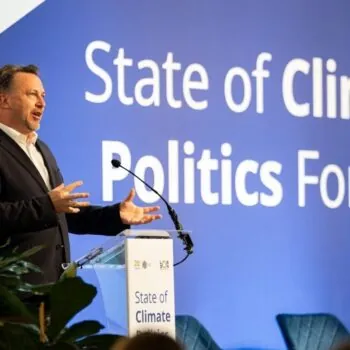If the plethora of announcements around the G7 weren’t enough to assure us that COP21 will be game-changing, then Climate Week will have convinced even the most ardent sceptics.
The level of political commitment and the real-economy tailwinds we’ve seen over the past month means an agreement in Paris is now 99% on the cards. But the devil is in the detail. Those that wish to see Paris fail are now more likely to muddy the waters than oppose it outright. A strong outcome in Paris will need to be precise and concise if we are to achieve an enduring regime to manage climate risk into the future.
Some of September’s highlights include:
EU Environment Council – ministers from all 28 EU countries secured common European positions ahead of Paris. Most notable was their agreement on the need for Paris to include a long-term goal to operationalise 2°C and a ratchet mechanism which can help deliver this vision to phase out fossil fuels by increasing ambition every 5 years. As you would expect, the language they agreed is a bit cumbersome, but the general gist is there – and this makes. the EU one of the first developed countries to support this type of architecture. The US shortly followed suit, with Obama coming out explicitly and stating that they also support the need to ratchet up ambition regularly to deliver the 2°C obligation.
US-China – the most significant take away from their joint declaration was China’s announcement that it would considerably increase its finance to help poor countries take climate action, from around USD 10 million to USD 3 billion. This is incredible news that really puts the pressure back on the US and EU to get a grip on how finance is included in the Paris agreement – i.e. beyond 2020. In good news for the ‘shifting the trillions’ debate, China also stated it would shift some of its own domestic and international finance away from fossil fuels, which will spur on efforts to reorient broader financial flows towards climate-compatibility.
Climate Finance – in addition to the Chinese announcement, the Multilateral Development Banks agreed to come up with a plan before COP21 to increase the amount of funding they dedicate to both adaptation and mitigation. The Asian Development Bank pledged to double its annual climate finance spending to USD $6 billion per year by 2020, constituting a third of the bank’s total spend. At the UN General Assembly, the UK pledged to double its climate finance budget to 2020, while President Hollande also announced France would increase its climate finance from USD$3 to 5 billion a year in 2020.
Mark Carney’s speech – Governor of the Bank of England Mark Carney backed climate action from the finance and regulatory community in an important speech advocating for a more well-informed debate about the risk of stranded fossil assets, a voluntary climate disclosure task force; and climate change stress-testing. By highlighting what’s at stake for the global economy from the physical risks from climate change, third party liability insurance claims and costs of transition, Carney’s speech demonstrates that climate change is now a mainstream economic issue.
INDCs – A glut of INDCs have come out. Brazil, Peru and Costa Rica were on the side of angels. Costa Rica put forward an unconditional INDC, meaning they no international support required to deliver their goals! Additional INDCs were tabled by key emerging economies: Indonesia, Turkey, India and Chile. Recent analysis now puts the world on track to a 2.7°C trajectory; this is not enough to avoid dangerous climate change, but gets us in a much better place going forward.
Pope Francis – building on his encyclical, Pope Francis used his visit to the US to call on Americans and the world to take urgent action on climate change. This coverage was amplified across the globe, demonstrating the role moral leadership can play in galvanising political action.
Ban Ki-moon’s speech to Leaders – around 40 Heads of State and Government sat down to lunch on Sunday 27th to discuss the most pressing issues to resolve ahead of Paris. Leaders’ engagement is absolutely vital ahead and during COP21 to tell a convincing story to the public and corporates that their governments mean business in tackling climate change. Highlights from their discussion include:
- framing Paris as sending a clear signal that the transformation of the global economy is inevitable – this is essential to understand what keeping global temperature rise below2°C means in practice
- operationalising the 2°C obligation could include the progressive decarbonisation of the global economy over the course of the century, or a shift towards 100% clean energy systems;
- encouraging national strategies to deliver low-carbon economies by 2050;
- sending a clear signal on the need to reorient all investment flows to be consistent with Adaptation and Mitigation aims
- affirming thatParis must progressively increase ambition over time
- committing themselves as Leaders to remain engaged



